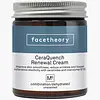What's inside
What's inside
 Key Ingredients
Key Ingredients

 Benefits
Benefits

 Concerns
Concerns

 Ingredients Side-by-side
Ingredients Side-by-side

Water
Skin ConditioningButylene Glycol
HumectantSqualane
EmollientNiacinamide
SmoothingGlycereth-7 Triacetate
EmollientCoco-Caprylate/Caprate
EmollientSaccharomyces Ferment
Skin ConditioningCaprylic/Capric Triglyceride
MaskingTriheptanoin
Skin ConditioningTocopheryl Acetate
AntioxidantGlyceryl Caprylate
EmollientLecithin
EmollientTromethamine
BufferingAmmonium Acryloyldimethyltaurate/Vp Copolymer
Caffeine
Skin ConditioningAcrylamide/Sodium Acryloyldimethyltaurate Copolymer
Emulsion StabilisingC9-12 Alkane
SolventPolyurethane-10
Citric Acid
BufferingIsohexadecane
EmollientPanthenol
Skin ConditioningSucrose
HumectantHydroxyethylcellulose
Emulsion StabilisingRetinol
Skin ConditioningLauroyl Lysine
Skin ConditioningCarbomer
Emulsion StabilisingGlyceryl Undecylenate
EmollientSodium Hyaluronate
HumectantPolysorbate 80
EmulsifyingOryza Sativa Bran Extract
Skin ConditioningSorbitan Oleate
Emulsifying1,2-Hexanediol
Skin ConditioningDecyl Glucoside
CleansingBHT
AntioxidantHydroxyacetophenone
AntioxidantSodium Benzoate
MaskingCaprylyl Glycol
EmollientPolygonum Cuspidatum Root Extract
AntioxidantGlycyrrhiza Glabra Root Extract
BleachingEthoxydiglycol
HumectantBetula Alba Bark Extract
MaskingBoswellia Serrata Extract
Skin ConditioningLycium Barbarum Fruit Extract
AstringentPhenoxyethanol
PreservativeFerulic Acid
AntimicrobialDisodium Phosphate
BufferingPolysorbate 60
EmulsifyingCentella Asiatica Extract
CleansingPalmitoyl Hexapeptide-14
Skin ConditioningSodium Phosphate
BufferingWater, Butylene Glycol, Squalane, Niacinamide, Glycereth-7 Triacetate, Coco-Caprylate/Caprate, Saccharomyces Ferment, Caprylic/Capric Triglyceride, Triheptanoin, Tocopheryl Acetate, Glyceryl Caprylate, Lecithin, Tromethamine, Ammonium Acryloyldimethyltaurate/Vp Copolymer, Caffeine, Acrylamide/Sodium Acryloyldimethyltaurate Copolymer, C9-12 Alkane, Polyurethane-10, Citric Acid, Isohexadecane, Panthenol, Sucrose, Hydroxyethylcellulose, Retinol, Lauroyl Lysine, Carbomer, Glyceryl Undecylenate, Sodium Hyaluronate, Polysorbate 80, Oryza Sativa Bran Extract, Sorbitan Oleate, 1,2-Hexanediol, Decyl Glucoside, BHT, Hydroxyacetophenone, Sodium Benzoate, Caprylyl Glycol, Polygonum Cuspidatum Root Extract, Glycyrrhiza Glabra Root Extract, Ethoxydiglycol, Betula Alba Bark Extract, Boswellia Serrata Extract, Lycium Barbarum Fruit Extract, Phenoxyethanol, Ferulic Acid, Disodium Phosphate, Polysorbate 60, Centella Asiatica Extract, Palmitoyl Hexapeptide-14, Sodium Phosphate
Water
Skin ConditioningGlycerin
HumectantPersea Gratissima Fruit Butter
EmollientGlyceryl Stearate Se
EmulsifyingArgania Spinosa Kernel Oil
EmollientOlea Europaea Fruit Oil
MaskingSimmondsia Chinensis Seed Oil
EmollientOlive Glycerides
EmulsifyingCetyl Alcohol
EmollientStearic Acid
CleansingRosa Moschata Oil
AstringentTocopherol
AntioxidantRetinyl Palmitate
Skin ConditioningPanthenol
Skin ConditioningSodium Ascorbyl Phosphate
AntioxidantSodium Levulinate
Skin ConditioningSodium Anisate
AntimicrobialSodium Hyaluronate
HumectantCeramide NP
Skin ConditioningUbiquinone
AntioxidantLactic Acid
BufferingFerulic Acid
AntimicrobialXanthan Gum
EmulsifyingGlyceryl Caprylate
EmollientWater, Glycerin, Persea Gratissima Fruit Butter, Glyceryl Stearate Se, Argania Spinosa Kernel Oil, Olea Europaea Fruit Oil, Simmondsia Chinensis Seed Oil, Olive Glycerides, Cetyl Alcohol, Stearic Acid, Rosa Moschata Oil, Tocopherol, Retinyl Palmitate, Panthenol, Sodium Ascorbyl Phosphate, Sodium Levulinate, Sodium Anisate, Sodium Hyaluronate, Ceramide NP, Ubiquinone, Lactic Acid, Ferulic Acid, Xanthan Gum, Glyceryl Caprylate
Ingredients Explained
These ingredients are found in both products.
Ingredients higher up in an ingredient list are typically present in a larger amount.
Ferulic Acid is a plant based antioxidant. By fighting free-radicals, ferulic acid can help reduce the formation of fine lines and hyperpigmentation.
When used with Vitamin C, Ferulic Acid has shown to prevent Vitamin C from breaking down. In other words, it acts as a stabilizer.
Ferulic Acid is sometimes used to preserve food. Foods containing Ferulic Acid include: oats, rice, eggplant, citrus.
In medicine, Ferulic Acid is being studied for helping with diabetes, Alzheimer's, and cardiovascular diseases.
Learn more about Ferulic AcidGlyceryl Caprylate comes from glycerin and caprylic acid, a fatty acid from coconut. It has emollient and emulsifier properties.
As an emollient, it helps hydrate your skin. Emollients work by creating a barrier on your skin to trap moisture in, helping to keep your skin soft and smooth.
On the other hand, emulsifiers prevent ingredients (such as oil and water) from separating.
Learn more about Glyceryl CaprylatePanthenol is a common ingredient that helps hydrate and soothe the skin. It is found naturally in our skin and hair.
There are two forms of panthenol: D and L.
D-panthenol is also known as dexpanthenol. Most cosmetics use dexpanthenol or a mixture of D and L-panthenol.
Panthenol is famous due to its ability to go deeper into the skin's layers. Using this ingredient has numerous pros (and no cons):
Like hyaluronic acid, panthenol is a humectant. Humectants are able to bind and hold large amounts of water to keep skin hydrated.
This ingredient works well for wound healing. It works by increasing tissue in the wound and helps close open wounds.
Once oxidized, panthenol converts to pantothenic acid. Panthothenic acid is found in all living cells.
This ingredient is also referred to as pro-vitamin B5.
Learn more about PanthenolSodium Hyaluronate is hyaluronic acid's salt form. It is commonly derived from the sodium salt of hyaluronic acid.
Like hyaluronic acid, it is great at holding water and acts as a humectant. This makes it a great skin hydrating ingredient.
Sodium Hyaluronate is naturally occurring in our bodies and is mostly found in eye fluid and joints.
These are some other common types of Hyaluronic Acid:
Learn more about Sodium HyaluronateWater. It's the most common cosmetic ingredient of all. You'll usually see it at the top of ingredient lists, meaning that it makes up the largest part of the product.
So why is it so popular? Water most often acts as a solvent - this means that it helps dissolve other ingredients into the formulation.
You'll also recognize water as that liquid we all need to stay alive. If you see this, drink a glass of water. Stay hydrated!
Learn more about Water